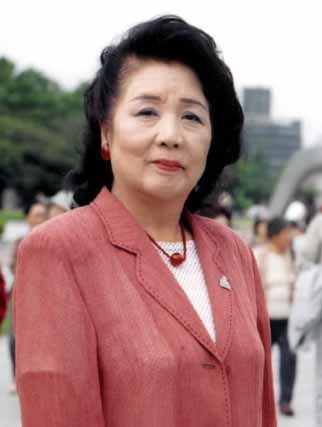Letters from A-bomb survivors to G8 Lower House Speakers, Part 4
Aug. 31, 2008
Praying for peace amid the aftereffects of the A-bomb
by Seiko Ikeda, 76, vice chair, Hiroshima Prefectural Confederation of A-bomb Sufferers Organizations
Sixty-three years have passed since the dropping of the atomic bomb. Throughout those years the survivors of the bombing have been plagued with frightening, painful, and sorrowful nightmares because they struggle with the fear of death, which may come at any time. Even now survivors are dying from the aftereffects of the bombing.
At the time of the bombing, I was 13 and a first-year student in junior high school. As a mobilized student, I was cleaning up after the dismantling of homes to make a fire lane at a location 1.5 kilometers from the hypocenter. I was severely burned by the atomic bomb and exposed to its radiation. I lingered on the brink of death, but somehow I survived.
But my face--when I was still so young, with so many dreams--was scratched and pulled and twisted as if by a devil. The emotional suffering I have endured for these 63 years cannot be expressed in words. No one else should ever experience the suffering we have gone through.
The dropping of the atomic bomb was a mistake made by human beings and is the ultimate symbol of the tragedy of war. With the prayer that nuclear weapons, which may lead to the annihilation of the human race, will disappear from the face of the earth as soon as possible, we, the A-bomb survivors, have called for the abolition of nuclear weapons and opposed war for more than half a century.
We thought that peace would finally be achieved in the 21st Century, but then almost 3,000 people lost their lives in the terrorist attacks in the United States on September 11, 2001.
But think about it: 63 years ago in Hiroshima, unarmed civilians, including little babies and the elderly, were also annihilated indiscriminately. Between 50,000 and 60,000 people were killed that day. By the end of 1945, 130,000 to 150,000 lives were lost.
In response to 9/11, the U.S. chose the path of vengeance. We have chosen not the path of vengeance but the path to peace, with love and prayer.
The threat of nuclear weapons has not abated but is instead growing. Hiroshima is a place to learn about the sanctity of life. If human beings do not eradicate nuclear weapons, nuclear weapons will eradicate us. As one who escaped death by the atomic bomb and was allowed to live, I feel I have a responsibility to look beyond my own interests and my own joys and sorrows and to continue to call for the abolition of nuclear weapons and to oppose war for as long as I live.
To the lower house speakers who will participate in the G8 summit, please hear the humble, heartfelt cry of this A-bomb survivor. I believe in your power. As long as government leaders, who represent the citizens, take no action, nothing can be changed. Please, with the conscience of a human being, listen to our message of love and reconciliation.
We, the A-bomb survivors, pray that our beautiful earth will be preserved and that the day will soon come when the people of the world will be able to live in peace and security. This prayer sustains us in our battle with the aftereffects of the bombing, which may assail us at any time.
I sincerely hope that your visit to Hiroshima will be fruitful.
Seiko Ikeda
Ms. Ikeda was born in 1932. She was exposed to the atomic bombing while working as a mobilized student. Obliged to be treated at her home on the outskirts of Hiroshima, she later underwent 15 reconstructive operations. She has recounted her experiences as an A-bomb survivor many times and has visited the United States and Italy five times each. She has also been to China, Tahiti, and India. In 2007 she was made an honorary citizen of Frascati, Italy in recognition of her activities.
(Originally published on August 29, 2008)








